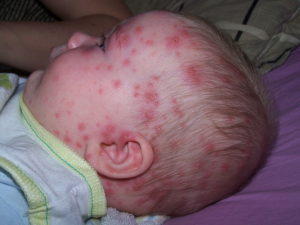Varicella is one of the diseases considered very common in childhood and is popularly known as chickenpox. Caused by a highly contagious virus, it can be contracted by anyone who has not previously had the disease or who has not been vaccinated.
Transmission of the Disease
Transmitted by droplets of saliva or nasal secretions, coughing and sneezing, or even through direct contact with another infected person. The virus can enter the child’s body through the conjunctiva of the eyes or the mucous membranes of the respiratory tract. The virus multiplies and spreads through the bloodstream until it reaches the skin, and the incubation period of the virus is 10 to 21 days. The time when the disease spreads most rapidly among children is during the cold winter months. This is due to the greater concentration of children in closed environments with little air circulation, allowing varicella to proliferate more quickly.
Treatment of Varicella
No treatment has yet been developed that completely eliminates varicella. Treatments recommended by specialists only help to relieve the symptoms and discomfort caused so intensely by the disease. After the diagnosis of the disease, avoid taking the child to public places to prevent the spread of the disease. It is recommended that the child stay away from school until all symptoms have disappeared. Usually, the treatments recommended to control the symptoms are very simple:
- Antipyretic (dipyrone or paracetamol) to control fever and pain;
- Oral antihistamine and antihistamine ointment to relieve itching;
- Baths with warm water;
A tip regarding diet is to avoid eating very salty foods and very hot foods so as not to increase the discomfort caused by sores that also appear inside the mouth. Do not medicate the child without a medical prescription, and do not attempt treatments on your own. Ideally, after the doctor’s diagnosis, the correct treatment should be followed to avoid further complications. Intense itching, if not controlled, can cause the body to become completely marked and leave scars where the blisters burst. Prevent the child from pulling off the scabs or scratching excessively.
How to Prevent Varicella?
The only way to prevent varicella is through vaccination. The vaccine is given in two doses, and all children from the age of 1 should be vaccinated and receive this vaccine for free at health centers throughout Brazil. The second dose of the varicella vaccine is not recommended for pregnant women, immunosuppressed people, or for those who have received another type of vaccine in recent days. The varicella vaccine protects against the most severe cases of the disease, but it is possible for a vaccinated person to contract the virus. Usually, people who are already vaccinated and contract the disease have milder symptoms, affecting fewer areas of the body, and often without a fever. Family members who live with the infected child or adult, even if vaccinated, have a 90% chance of being infected if they have never had the disease. Transmission begins 48 hours after the person starts experiencing the first symptoms. 
Symptoms of Varicella
The symptoms usually begin to appear 20 days after contact with an infected person. They initially start as irritation, itching, and intense tiredness. Other symptoms that can occur in both children and adults include:
- Lack of appetite;
- High fever;
- Red spots all over the body;
- Water-filled blisters up to 1 cm that cause severe itching.
Generally, these blisters start on the abdomen and begin to spread across the body, face, and other parts. The scalp is also affected, but less intensely than the rest of the body. Everything starts as small spots, which in a second stage become fluid-filled blisters. The blisters begin to burst and create small sores that turn into scabs, and only after they have completely disappeared, the person is cured of varicella. The duration of varicella is between 1 to 2 weeks, but it depends on how intensely each person contracts the virus. Some people experience intense lesions, and others may have very mild cases. In more severe cases, varicella can affect the mucous membranes and the genital area. Also read: Diabetes: Main Causes, Symptoms, and Treatments Photo: ILJR











